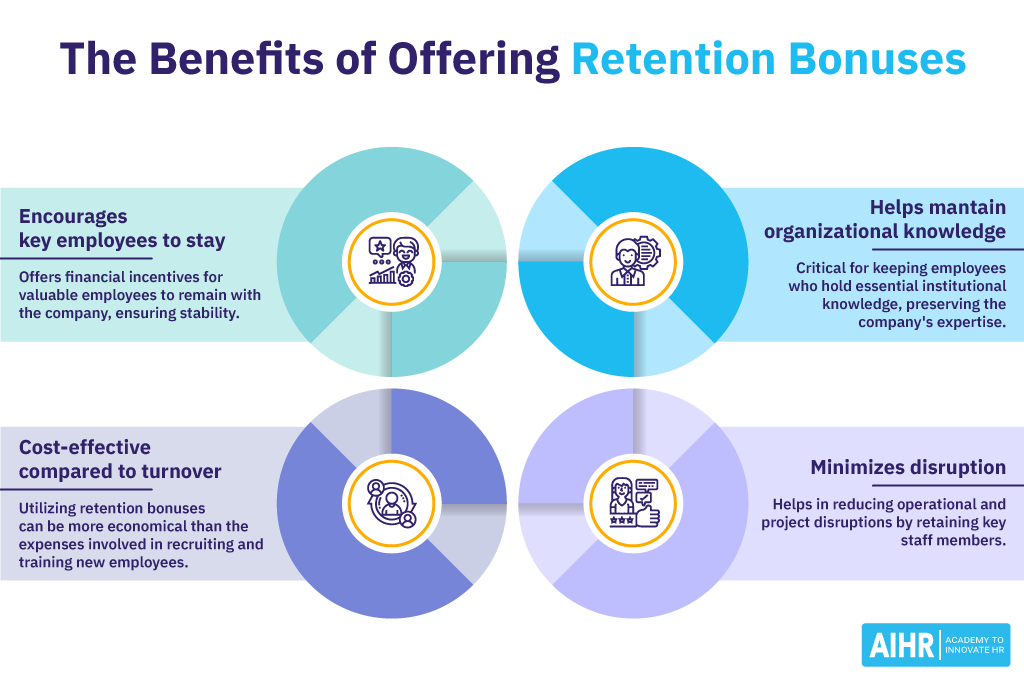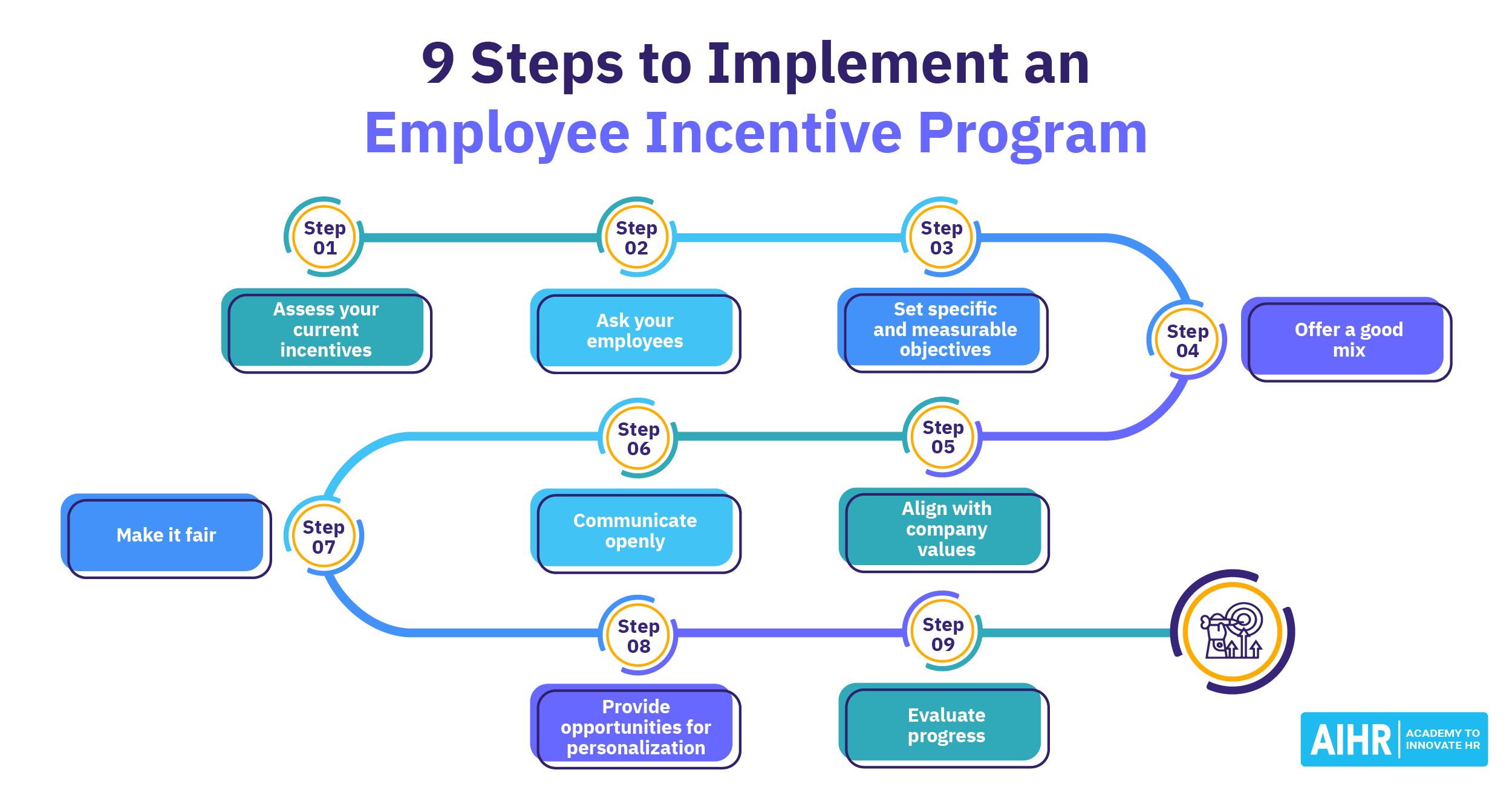Retention Bonus
What is a retention bonus?
A retention bonus is a financial incentive, usually paid out as a lump sum, offered by an employer to a valuable employee to encourage them to stay with the company for a specified period of time. This type of bonus is typically used when the continuity of the employee’s service is considered crucial to the organization’s success or stability.
Retention bonuses are common during mergers, acquisitions, periods of significant change or transformation within the company, or when there is a high demand for skilled workers in the job market, making it easy for employees to find alternative employment.
What is an average retention bonus?
A retention bonus may vary from a modest sum to a significant percentage of an employee’s yearly salary, often between 10% to 25% of their base pay. However, in industries that highly value specialized skills or in situations where an employee’s exit would cause significant disruption, the bonus could exceed these percentages.
Benefits of offering retention bonuses
Offering retention bonuses can be a strategic tool for companies aiming to maintain a stable and experienced workforce. Here are some of its benefits:
- It encourages key employees to stay: Retention bonuses provide a financial incentive for valuable employees to remain with the company for a specified period.
- It helps maintain organizational knowledge: Retention bonuses are crucial in incentivizing employees to remain with the company, preserving the invaluable institutional knowledge and expertise they have accumulated over time.
- It minimizes disruption: By encouraging key employees to stay, companies can reduce disruptions to their operations and ongoing projects.
- It’s cost-effective compared to turnover: The cost of hiring and training new employees can be significantly higher than retaining existing ones. Retention bonuses can be a cost-effective strategy to maintain institutional knowledge and reduce the costs associated with turnover.

Tax rate of retention bonuses
Retention bonuses in the United States are taxable as supplemental wages under IRS rules, subject to federal income tax, Social Security, and Medicare taxes. There are two primary methods the IRS allows for withholding taxes on supplemental wages, such as retention bonuses:
- Percentage method: With this method, bonuses are separated from the employee’s salary and taxed directly at a flat rate of 22%. However, a bonus exceeding $1 million is subject to a higher taxation rate of 37%, corresponding to the maximum income tax rate applicable for the given year.
- Aggregate method: Here, the bonus is combined with the employee’s usual salary into a single payment for the purpose of tax withholding. The withholding table determines the applicable tax rate, referencing the data provided on the employee’s IRS W-4 Form.
Retention bonus examples
There are several ways retention bonuses can be issued. Below are some common types and how they might be applied:
- Lump sum: This is a one-time payment made to an employee at the end of a specified period or upon completion of a critical project, often used after mergers, acquisitions, or during significant organizational changes to retain key personnel until the transition is complete.
- Installment bonuses: Payments made to employees regularly over a specified period rather than a single lump sum. It is helpful for longer projects or transitions, encouraging employees to stay for the duration of the critical period.
- Tiered bonuses: The size of the bonus increases with the length of time an employee remains with the company.
- Deferred bonuses: A portion of the bonus is paid upfront, with the remainder paid after a certain period or upon achieving specific milestones. Useful for retaining employees through multiple phases of a project or transition, ensuring their commitment over more extended periods.
What HR should include in a retention bonus agreement?
Here’s what HR should typically include in a retention bonus agreement to ensure clarity, fairness, and legal compliance:
- Qualification requirements: Determine who is eligible for the bonus. Criteria may include job function, level of seniority, specific skills, or contribution to critical projects.
- The retention bonus details: Decide on the bonus amount and whether it will be a flat rate, a percentage of the employee’s salary, or based on other factors such as performance metrics.
- Timing of payment: Common approaches include lump-sum payments after a certain service period, phased payments at key milestones, or a final payment upon project or transition period completion.
- Clawback provisions: Outline specific conditions under which the bonus must be repaid to the company. These conditions might include voluntary resignation or termination for cause before a specified period.
- Tax implications: Consult with legal and financial experts to understand the legal and tax implications of the retention bonus for both the organization and the employees.
HR tip
Regularly review and adjust retention bonuses to reflect current market trends and the evolving needs of your workforce. This proactive approach ensures your strategy remains competitive and relevant, effectively retaining key talent in a dynamic employment landscape.
FAQ
A retention bonus is typically paid out at a predetermined time specified in the retention agreement, which is after the employee has fulfilled the required condition of staying with the company for a certain period.
A retention bonus can vary widely, from a few thousand dollars to over 50% of an employee’s annual salary, depending on their role, expertise, and the importance of retaining them during critical company events like mergers or major projects. The average retention bonus is 10% to 25% of the employee’s base pay.
A bonus is a financial reward given to employees for their performance or contributions to the company’s success, often tied to performance metrics and paid annually. In contrast, a retention bonus is specifically designed to incentivize employees to remain with the company and is paid upon completing a specified employment term. While a regular bonus rewards past performance, a retention bonus is forward-looking, aiming to secure the employee’s commitment to the company for a future period.







